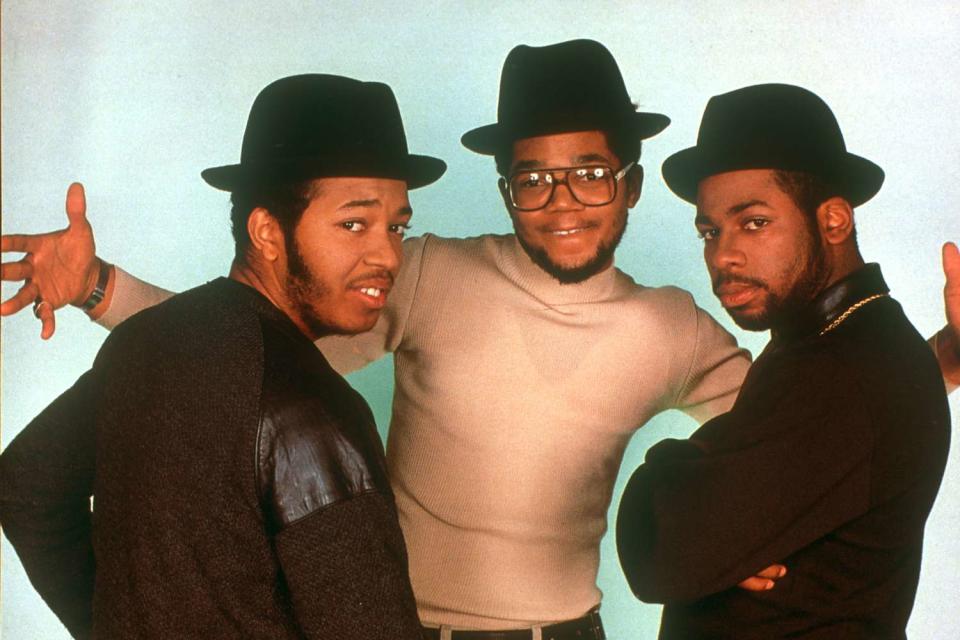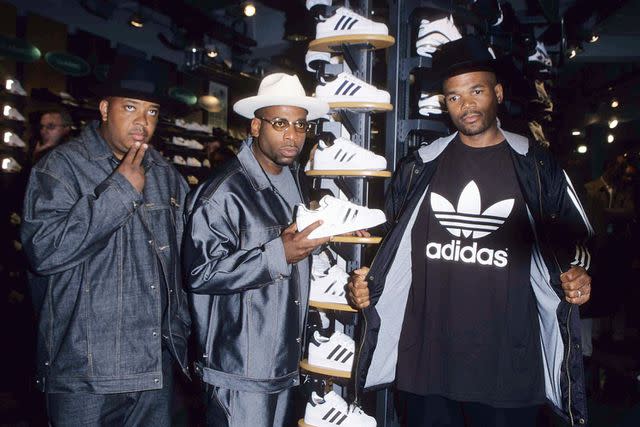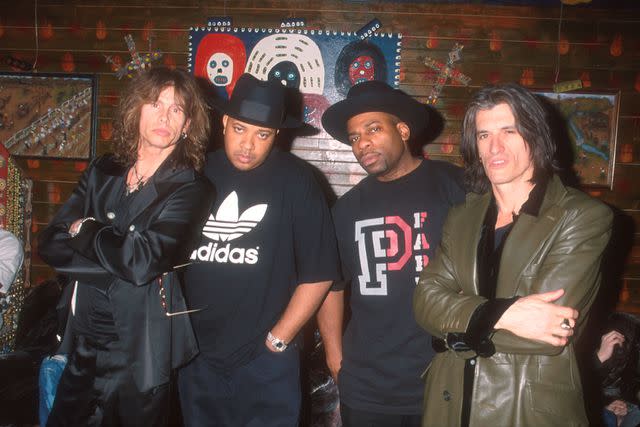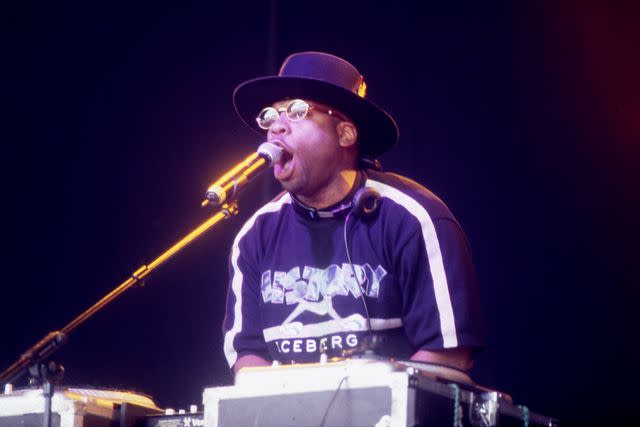The Biggest Revelations from Run-DMC's Docuseries “Kings From Queens” — Including Writing 'My Adidas' on 'Angel Dust'
- Oops!Something went wrong.Please try again later.
- Oops!Something went wrong.Please try again later.
- Oops!Something went wrong.Please try again later.
'Kings From Queens: The Run DMC Story' premiered Thursday on Peacock

Michael Ochs Archives/Getty
Run-DMCRun-DMC, a trio from Hollis, Queens, changed the rap game.
In Kings From Queens: The Run DMC Story, members Joseph "Rev Run" Simmons and Darryl "DMC" McDaniels recount how they revolutionized hip-hop with hits like "My Adidas" and "Walk This Way."
From mixing tracks in basements to being the only hip-hop group to play Live Aid in 1985 and the tragic murder of third member Jam Master Jay in 2002, Kings From Queens gives fans an inside look at the lives of the hip-hop trailblazers.
Here are the biggest revelations from the three-part documentary, available to stream on Peacock now.
Rev Run pressured DMC to go to the studio — and believed he was his 'brother in rhyme'
Though DMC, 59, grew up writing and rhyming, it wasn't until Rev Run, also 59, gave him that little push that Run-DMC was born.
"I was always writing but I never wrote to record. I wrote because I needed a release," DMC said in the film, adding that music was his escape as he would get bullied in school.
Then, around the time they were getting ready to graduate high school, Rev Run gave DMC a call and picked him up to go to a studio in Manhattan. That's where everything began.
"You gotta understand something about D, this is a straight-A student with glasses who was into comic books," Rev Run said. "D actually had all the skills in my mind to get whatever I needed done and he could rhyme. So I just had to convince Russell [Simmons, Rev Run's older brother] that this is my partner in crime — or better yet partners in rhyme."
At that studio session, they wrote "It's Like That" — but it was only meant for Rev Run. When the song was finished, Rev Run told DMC he needed to "convince" Simmons he could "really do this," since he was viewed as just his "knuckle-head friend."
DMC initially refused — but once he got in the booth and showed Simmons a rhyme he came up with on his own, "everybody in the studio flips out."
"The partnership was made in heaven," said Simmons.
Russell Simmons came up with the lyrics to 'My Adidas' when he was high on "angel dust"

Fred Duval/FilmMagic
Run-DMCTrue hip-hop enthusiasts know the deal — when you think of Run-DMC, you think of Adidas.
As it turns out, "My Adidas," which took Run-DMC to new heights in the music and fashion world, was written by Simmons when he was high on "angel dust."
"I just had a wet bag of angel dust," Simmons recalled in the doc. "Like yo, 'We need to do something about them sneakers.' And I gave them a few of the lyrics."
The hit song led to a groundbreaking deal with the brand. The rappers never lost their affinity for Adidas and still wear it to this day.
Run-DMC thought 'Walk This Way' would ruin their careers
While Run-DMC had made their mark in the music scene, they had to figure out a way to continue making hits once new acts like Beastie Boys and LL Cool J came into the picture.
It was then that legendary producer Rick Rubin suggested they recreate Aerosmith's "Walk This Way." At first, they met the idea with hesitance and thought, "This is not gonna turn out good."
"Instead of just having the spirit of hip-hop and rock together, you had the presence together. It was a game-changer," DMC said.
This record also tapped into a new fanbase for Run-DMC.

Jeffrey Mayer/WireImage
Steven Tyler, Run-DMC and Joe PerryRev Run was 'cocky' — and DMC was the 'calming agent'
Though Rev Run and DMC grew immensely, they found themselves in completely different places when it came to handling fame.
"Rev went from a pretty calm individual to a cocky mother f---er over night," Ed Lover, a radio personality said in the series. "And I think it was warranted."
"Part of the cockiness was because they were counted out," Lover added. "I think that caused them to become more assertive."
While Rev Run developed this persona, DMC felt like fame was too much for him. He was the "calming agent."
"As we got big and started doing these shows, I wasn't into the fame s---," said DMC. "I got more joy out of writing it and then recording it."
When it came to performing, DMC would get anxiety and often thought, "Oh s---, I don't want to do that."
How did he get through? He found strength in comic book superheroes.
"I would think, 'What would the Hulk do? What would Peter Parker do? What would Captain America do?' And then I would go out there and do it," DMC said.
Related: Third Man Charged in Fatal 2002 Shooting of Run-DMC's Jam Master Jay
Sarah McLachlan's music saved DMC when he was ready to give up

Martyn Goodacre/Getty
Jam Master JayAfter the death of Jam Master Jay in 2002, DMC had already been struggling with his mental health and took the loss very hard.
"I didn't know what to do. I was just ready to give the f--- up," he said in Kings From Queens. "I wasn't dealing with the feelings that I was going through."
One day, DMC was coming back from Europe and got picked up by a young driver at the airport. The driver kept looking over and eventually told him he was a big fan — and his music would get him through his "darkest days."
Then, he heard Sarah McLachlan's "Angel" on the radio.
"It saved my life," DMC said of that moment. "Jay is dead. Run-DMC is definitely over. I'm very depressed. But I heard Sarah McLachlan's 'Angel' on the radio."
"For one whole year, all I did was listen to Sarah McLachlan records," he added.
Later, DMC told McLachlan how much she meant to him at a Grammys party.
"She said, 'Thank you for telling me that, Darryl. That's what music is supposed to do.' That changed everything," he recalled. "I started thinking, 'You can drink and die — or you can not drink and live.'"
For more People news, make sure to sign up for our newsletter!
Read the original article on People.

